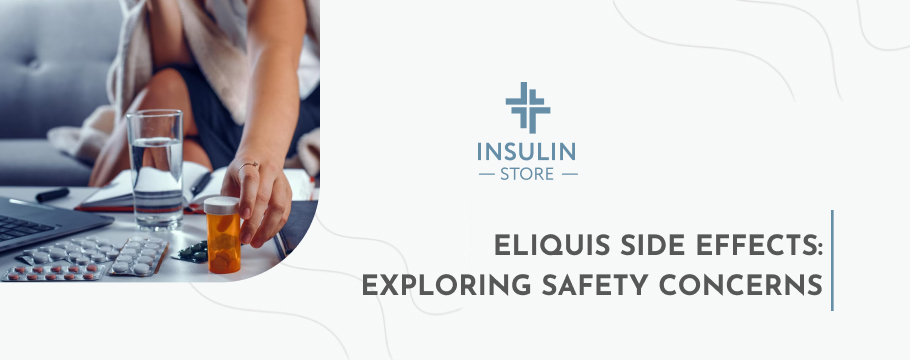Blog

Eliquis Side Effects: Exploring Safety Concerns
Blood thinners are sometimes something that must be added to a person’s routine to ensure they are safe and won’t be in danger because of the absence of timely treatment. One of the most popular brands on our website is Eliquis – a brand-name medication that comes in the form of pills, which most people find more comfortable than injectable products meant for the same goal.
The main issue of most blood-thinners many individuals are concerned about are side effects that may sometimes progress into severe conditions; that’s why it’s vital to know all of them in advance and know when it’s time to contact a doctor and get proper medical help. So, today’s article is dedicated to this topic and the way Eliquis should be used to minimize the chances of severe adverse reactions. Follow along and learn more together with the team of our specialists!
Welcome to Insulin.store’s enlightening blog post, “What Kind of Ice Cream Can Diabetics Eat?” Explore a delectable world of ice cream options that cater to individuals with diabetes, providing delightful treats without compromising health.
Eliquis Definition and Working Principle
The Eliquis brand is a new-generation anticoagulant more preferable over other medications of the older type (such as Warfarin). Its main benefit over other treatment options is no need for frequent blood tests, fewer chances of serious bleeding, and fewer food and drug interactions.
Typically, Eliquis is prescribed to deal with the following medical goals:
- Prevent blood clots and strokes for those with atrial fibrillation (irregular heartbeat);
- Reduce risks of blood clots for those who recently went through hip or knee replacement surgery;
- Decrease the chances of pulmonary embolism (blood clot in one’s lungs) and deep vein thrombosis (blood clots in legs).
Please keep in mind that Eliquis is a prescription medication, so buying it over the counter is impossible. To ensure the experience with this brand will be safe and non-problematic, a doctor’s guidance is required to calculate the correct dosage, select safe supporting medicines, and create the best treatment scheme for one’s needs.
The Correct Way to Use Eliquis
In case doctors prescribe Eliquis to cure patients, reading the leaflet that comes with the medication before you start using it is essential. In addition, we highly recommend consulting with a specialist in case there are any questions that are not covered in the information leaflet.
Typically, Eliquis must be taken twice a day (every twelve hours) by mouth; it doesn’t matter whether you do it with or without food. Some people find it difficult to swallow the tablet, so it may be better to crush it and mix it with the liquid of your preference (water, juice, etc.).
What are the factors that may help define the required dose to see positive results? Age, weight, medical conditions, general response to the medication, kidney function, and other medicines needed to maintain one’s health in good shape.
The pills must be taken at approximately the same time every day to create the habit in the body. You shouldn’t stop taking Eliquis without discussing it with a doctor first, as it may be dangerous and lead to unexpected adverse reactions if the medication is suddenly stopped. The right way to stop Eliquis treatment is by gradually decreasing the dose until it can be removed from one’s treatment plan. Please, order your refill on time and never run out of the drug to avoid unwanted problems and unfortunate complications caused by the withdrawal syndrome.
Safety Information About the Brand
To ensure the experience with Eliquis is positive, safety information must be discussed with a doctor in advance to give a person a better understanding of the medication they will work with. It includes limitations, acting principles, and, of course, possible adverse reactions. This step is also important because knowing when to ask for help and contacting a medical professional if weird or concerning symptoms occur is vital. So, without further ado, let’s start the discussion.
Eliquis Common Side Effects
One of the most common side effects of Eliquis as a blood thinner is, obviously, bleeding. Women may experience more durable and heavier menstruation, cuts may bleed longer, and nosebleeds may increase up to a few minutes. In this case, alternatives should be discussed with a doctor because not all blood thinners cause bleeding, so maybe Eliquis is just not the right option for you.
Other common adverse reactions include:
- Bleeding gums or nose;
- Dizziness;
- Nausea;
- Higher chances of bruising;
- Headache;
- Rash.
The worst people may experience from these symptoms is discomfort. Be patient and wait till they all are gone, or consider alternatives to replace Eliquis in your treatment plan.
Serious Eliquis Side Effects Reviews
Knowing severe adverse reactions to certain medications is a safety key for every patient’s treatment plan and positive experience with the product. The best thing a person can do if any serious side effects are noticed is to get in touch with their doctor as quickly as possible to prevent them from worsening.
You should first remember severe allergic reactions that may cause hives, itching, breathing problems, dace and tongue swelling, chest pain, and dizziness. Also, regarding spinal blood clots. Keep in mind that those who undergo a spinal tap, epidural, or other kinds of spinal procedure have higher chances of developing a blood clot in the spinal cord (this condition is also often referred to as a spinal or epidural hematoma). Unfortunately, if not taken care of on time, it can be the reason for permanent or long-term paralysis. As this medicine can affect blood clotting in an individual, it’s also common to experience minor bleeding during spinal procedures or hip and knee replacement surgeries.
What other severe adverse reactions can patients experience?
- Heavy bleeding during periods;
- Joint pain and swelling;
- Urine color changes (red, brown, pink);
- Uncontrollable bleeding from the injured spot;
- Vomiting or coughing out blood or something that looks like coffee grounds;
- Tightness and pain in the chest;
- Trouble breathing.
One of the best things about Eliquis is that this product is safer than many other blood thinners you can buy in pharmacies. It causes complications more rarely than other brands, and even though some may be the reason for health troubles, they can be controlled with the help of timely appointments in a clinic and a licensed medical professional.
Eliquis Warnings to Consider
Even though Eliquis is one of the most popular medications for those at high risk of blood clots formation, so let’s look closely at some common limitations you should know before selecting this option among all others available out there. Of course, these aspects should also be discussed in a doctor’s office before they prescribe you a proper treatment:
- Known allergies to Eliquis or similar products in the past;
- Artificial heart valve;
- Approved liver problems diagnosis;
- Current intake of other blood clotting medications;
- Pregnancy or trying to conceive, as this product is harmful to the fetus;
- Breastfeeding in women;
- Antiphospholipid syndrome or other issues that may encourage blood clot formation.
How to Avoid Eliquis Adverse Reactions
Eliquis is an effective option many patients can benefit from. In addition, there are a few tips and tricks that may help people avoid serious adverse effects and have a positive experience with this brand. Here they are:
- Don’t ignore the schedule. Eliquis works best if taken according to the instruction a doctor provides during the consultation. Typically, pills must be taken daily before or after eating;
- Don’t experiment with the dose. All changes must be discussed with a doctor not to let severe adverse effects develop. In case the intake was accidentally missed, contact a specialist and discuss what should be done in this case according to your personal needs;
- Be honest with your doctor. Openly discuss all the allergies, health conditions, recent surgeries, and other things that may affect your experience with Eliquis. This way, the most beneficial treatment plan may be created with a nice bonus of safety and improvement without complications. Discussing all the details in advance is vital to a positive experience with the product.
Storage Information
To ensure Eliquis works appropriately and provides expected results unmistakably well, it’s vital to remember safety rules and storage information. This way, it’s easier to pay attention to the quality of the product, which is critical for preventing blood clots effectively.
The main rules here are to store the pills at room temperature, away from daylight and moisture; these direct oral anticoagulants may be hard to swallow for some individuals, so some people crush them into powder to mix with the water or apple juice. If so, you must take the mixture within two hours; otherwise, it’ll go bad and won’t provide the improvement people may hope for.
Looking for the best weight loss solution between Saxenda and Wegovy? Look no further! The Insulin Store Blog provides a detailed comparison to help you make an informed decision. Discover the differences, benefits, and effectiveness of these two popular medications.
You should discard Eliquis if it’s gone bad or is no longer needed to support one’s health goals. It is forbidden to flush them down the toilet or pour them into the drain (ask your doctor or pharmacist about proper discard rules in your area). Be careful and keep the product away from children and pets; if a child or an animal accidentally swallows the pill, contact your doctor immediately to receive proper instructions regarding how to act to avoid dangerous conditions. If taken under control on time, there should be no complications whatsoever.
The Bottom Line: About Eliquis Side Effects
Eliquis medications belong to the blood-thinners category and are helpful for people with blood-clotting disorders that may worsen their diabetes journey. It’s also one of the most widely used brands when it comes to an increased risk of blood clotting after surgeries and other medical procedures. To understand how this medicine may help with certain conditions, visiting a doctor’s office and discussing all the treatment nuances with a professional is vital. On top of that, the dosage and its alteration must also be agreed with a specialist first to ensure there won’t be any unwanted adverse reactions or unexpected complications because of these actions. Providing a safe experience and health improvement is the primary goal of Eliquis, and we hope now it’s easier for you to set your priorities as you are now fully aware of all possible risks!
